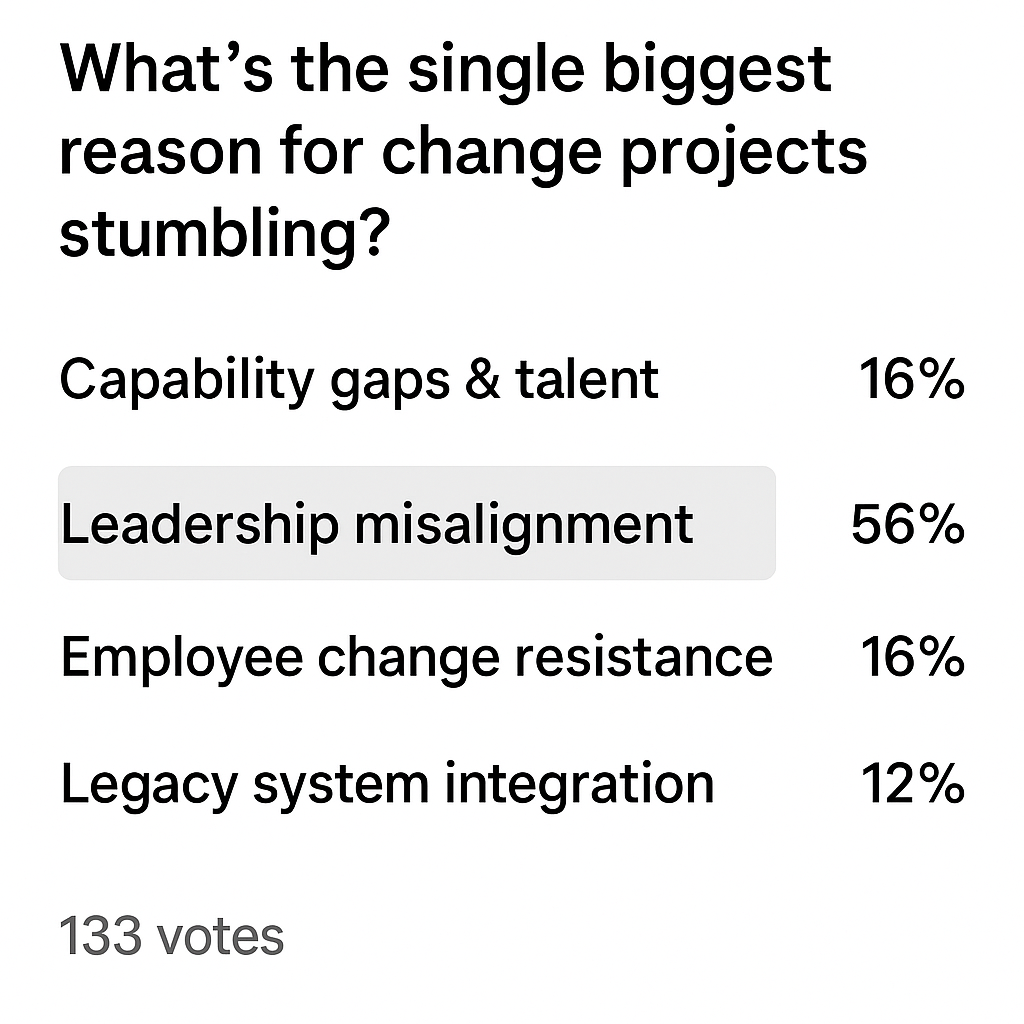Written by Tim Donaghy

Date Posted: Monday, 12th May 2025
Digital transformation has become a strategic imperative for UK organisations across every sector. From financial services to manufacturing, healthcare to retail, companies are investing unprecedented resources in cloud migration, data platforms, AI integration and modernised infrastructure. The commitment is substantial, with UK businesses continuing to increase their digital transformation spending year on year
Yet despite this, the success rate remains alarmingly low. Research consistently shows that approximately 70 % of digital transformations fail to achieve their stated objectives or deliver sustainable value, with Boston Consulting Group’s April 2025 analysis of 1,700 global programmes finding that only “about one-third accelerate growth in a value-accretive way.”
For UK organisations specifically, many business leaders report their transformation initiatives as "not fully meeting expectations" in terms of ROI, timeline or business impact.
This article examines why so many transformation initiatives underperform despite significant investment, highlighting how talent factors often determine success or failure. By understanding these underlying causes, organisations can develop more effective approaches to digital transformation, approaches that balance technological innovation with the human capabilities essential for sustainable change.
The conventional narrative around digital transformation emphasises technological innovation, implementing new systems, migrating to cloud environments, developing data platforms and integrating AI capabilities. This technology-centric framing dominates boardroom discussions and implementation roadmaps.
Yet when transformation initiatives falter, technology implementation rarely appears as the primary cause. Post-implementation reviews of unsuccessful transformations frequently highlight people-related factors as significant contributors to underperformance:
This pattern appears consistently across sectors. As an example, the UK financial services industry has invested heavily in digital platforms, yet many technology modernisation initiatives in banking deliver below-expected value, with integration challenges and adoption issues frequently cited as contributing factors.

Research consistently indicates that human factors, change management, skill development and organisational alignment all play a more decisive role in transformation outcomes than technical implementation challenges; the World Economic Forum’s Global Lighthouse Network: Mindset Shifts Driving Impact and Scale in Digital Transformation (Jan 2025) highlights that the newest Lighthouses overcame the “digital scaling slump” specifically by “partnering with their frontline workforces to localise adoption.”
The message becomes clear: while technology enables transformation, people determine its success.
For UK organisations, the people dimension of transformation is particularly challenging due to a persistent and growing digital skills gap. This talent shortage creates a fundamental constraint on digital ambitions that technology investment alone cannot overcome.
The Scale of the UK Skills Gap
The dimensions of this talent challenge are substantial:
This national skills shortage creates particular challenges for transformation initiatives, which typically require specialised capabilities beyond general digital literacy. The most critical transformation roles combine technical expertise with business understanding and change leadership, a combination that remains in short supply across the UK talent market.
Transformation-Specific Capability Gaps
Successful digital transformation requires specific capabilities that frequently remain underdeveloped in UK organisations:
1. Translational Leadership
Transformation demands leaders who can bridge business strategy and technical implementation with individuals who understand both commercial objectives and technological possibilities. Gartner’s 2025 CIO & Technology Executive Survey calls these hybrids “digital vanguard” leaders, noting they “co-own digital delivery end-to-end” and meet with CIOs four times more often than their peers to keep technology aligned with business value.
The shortage of professionals with this hybrid expertise creates a critical vulnerability in many transformation initiatives. Without effective translation between business and technical domains, organisations often develop solutions that are technically sound but commercially irrelevant, or strategically aligned but technically impractical.
Navigating Your Tech Leadership Journey? Read our insight
2. Change Enablement Expertise
Transformation fundamentally involves changing how people work, new processes, tools, decision frameworks and collaborative approaches. Effective implementation requires specialists who understand the human dimensions of change, including:
These change enablement capabilities remain underdeveloped in many UK organisations, with fewer UK companies maintaining dedicated change management resources for digital initiatives compared to international counterparts.
3. Integration Specialisation
In established organisations, transformation rarely occurs on a greenfield basis. Instead, it requires careful integration with legacy systems, processes and organisational structures. This integration demands specialised expertise combining:
The professionals who possess this integration expertise are in high demand across the UK market, yet their contribution often determines whether transformation value is actually realised.
4. Technical Specialisation in Transformation Technologies
Beyond general digital skills, transformation requires deep expertise in specific technical domains such as:
The UK faces significant demand for these specialised technical areas. Government and industry studies continue to flag acute shortages of cloud engineers and data specialists: a March 2025 Public Accounts Committee report covered by The Guardian warned that the civil-service ambition to scale AI is “compromised by legacy systems, low-quality data and a scarcity of suitably skilled staff,” noting competition with the private sector for cloud-migration and data-engineering expertise.
This talent gap creates a fundamental constraint on digital transformation ambitions. Without these essential capabilities, even the most sophisticated technology investments struggle to deliver intended outcomes.
Beyond the external talent challenges, many organisations inadvertently undermine their transformation success through internal approaches that fail to address the people dimension effectively.
Transformation as a Technology Exercise
Despite evidence that people factors significantly influence transformation outcomes, many organisations continue to frame digital initiatives primarily as technology implementations. This framing has significant consequences for resource allocation and priorities:
This technology-centric framing creates a predictable pattern: substantial investments in sophisticated platforms that remain underutilised because the human elements weren't sufficiently addressed.
The Staffing Afterthought Pattern
For many organisations, staffing considerations emerge as an afterthought rather than a foundational element of transformation planning. This reactive approach to talent manifests in several ways:
In contrast, successful initiatives integrate workforce planning directly into transformation roadmaps rather than treating hiring as an afterthought.
The Structural Limitations of Internal Hiring Approaches
Many organisations attempt to support transformation hiring through traditional internal recruitment functions, despite evidence that this approach creates significant risks. Conventional recruitment processes are often misaligned with transformation talent needs:
These structural limitations create serious impediments to securing the capabilities that transformation requires. When internal teams are overwhelmed or simply not configured for specialised digital hiring, the recruitment process becomes reactive, inconsistent and ultimately risky for transformation outcomes.
Leadership Bandwidth Constraints
Digital transformation places extraordinary demands on leadership time and attention. Many initiatives struggle because leaders find themselves caught between strategic direction setting and operational talent management:
This bandwidth constraint forces difficult trade-offs between transformation guidance and talent management, often compromising both in the process.
Despite these challenges, organisations can significantly improve their transformation outcomes by adopting people-first approaches. Research indicates that transformations emphasising people and change management outperform those that treat change as a purely technical rollout; Forrester’s Digital Transformation Services Landscape, Q2 2025 shows programmes led by providers with “dedicated organisational-change offerings” deliver 23 percentage-point higher ROI than tech-only engagements.
1. Elevate Talent Strategy to a Core Transformation Pillar
Successful transformation begins with recognising talent strategy as a foundational element rather than a support function:
This elevation ensures that people considerations influence transformation planning from inception rather than emerging as afterthoughts during implementation.
2. Map Critical Capabilities with Precision
Move beyond generic digital skills requirements to identify the specific capabilities that will determine transformation success:
This precise capability mapping creates the foundation for effective talent strategy, ensuring resources target the most critical needs.
3. Develop Multi-Channel Talent Approaches
Recognise that no single talent source can address all transformation needs:
4. Establish Strategic Talent Partnerships
For external hiring needs, move beyond transactional recruitment relationships toward strategic partnerships:
These strategic partnerships provide access to talent networks and market intelligence that traditional recruitment methods cannot match.
5. Create Compelling Transformation Employment Propositions
In a talent-constrained market, attraction strategies must extend beyond compensation:
This authentic approach to talent attraction proves particularly important for senior transformation roles, where candidates carefully evaluate organisational readiness alongside role specifics.
6. Build Sustainable Internal Capability
While external hiring often provides immediate capability, long-term transformation success requires building sustainable internal expertise:
This capability building approach ensures that transformation creates lasting organisational value rather than temporary change dependent on external expertise.
Digital transformation represents both opportunity and challenge for UK organisations. The potential value is enormous, enhanced customer experiences, operational efficiency, data-driven decision making and innovative business models. Yet realising this value demands more than technological investment.
The evidence points consistently to the critical importance of people factors in transformation outcomes. The organisations that succeed approach transformation first as a human challenge enabled by technology, not a technological challenge with human implications—echoing Harvard Business Review’s February 2025 essay “Why Digital Transformation Starts with People,” which argues that cultural readiness accounts for “over half the variance” in digital-value capture.
They recognise that no platform, system or algorithm can deliver sustainable change without the right capabilities surrounding it.
For executives leading transformation initiatives, this perspective prompts essential questions:
The answers to these questions often determine whether transformation investments deliver their intended value or join the many that fall short of expectations.
In the digital age, competitive advantage emerges not from the technologies organisations purchase but from how effectively their people leverage these technologies to create value. By placing talent at the centre of transformation strategy, organisations can significantly improve their odds of success, turning digital aspiration into sustainable business value.
Looking to develop a more comprehensive approach to your transformation talent strategy? Our guide on People-Powered Digital Transformation provides a complete framework for integrating talent considerations into your digital initiatives.

As a founding member and Director of TRIA, Lara has been instrumental in shaping its strategic direction and ensuring its commitment to client success. Her expertise in the recruitment industry is matched by her dedication to fostering a collaborative and innovative work environment.
Connect on LinkedIn
Written by Tim Donaghy


Written by Lara Webb
